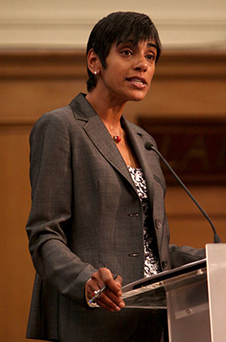 Reeta Chakrabarti
Reeta Chakrabarti
Interviewer:
You went to school in India for a while, was that an English-medium school?
Reeta Chakrabarti:
Yes, it was. I went twice. I went once when I was nine, and that was just for a few months, and it was an English-medium school, and then I went again when I was 15 and that was for 18 months, and I did my O-levels there, (this was in the eighties), and that was also an English-medium school, and it was an international school, so there were children from all over the world there, most of them part of the Indian diaspora, but not all. Er, and I loved it, I really loved it. I loved the fact that there were different nationalities, different languages, we all spoke English but there was a certain amount of Bengali as well, and for me it was a nice buffer really between, you know, leaving the UK and arriving in this exciting, but very strange and different place, which was India.
Interviewer:
What language was spoken in the playground?
Reeta Chakrabarti:
English.
Interviewer:
Because that was the common language?
Reeta Chakrabarti:
That was the common language, yes.
Interviewer:
Some people are said to be gifted for languages, for learning languages, did it come easily to you? You said French was a bit difficult at first.
Reeta Chakrabarti:
Yes, French was difficult at first and I think it was more a question of my putting my mind to it and deciding that’s what I wanted to do. I think I’m better at some aspects of language than others. With French, for example, I’m very literary, I love literature, I did English and French at university, and so when I did French, the thing I really loved was the studying of French literature; but also the spoken word. I got a great deal out of my year abroad in France, I really loved it, and I became really a good speaker, but I was not very good at writing French, and that’s partly laziness, but I also sometimes wonder, is it because I have oral Bengali? And perhaps I’m quite good at communicating, but not actually particularly good at writing.
Interviewer:
They say language learning opens doors to cultures, have you found that the languages you speak helped you get to know other cultures or people better?
Reeta Chakrabarti:
Yes, very much so, very much so. You can get under the skin of a culture in the way that you can’t if you don’t speak the language, and you can make connections with people, have very immediate connections with them if you speak the language and that’s true; true in India and in France, and we all know when we go on holiday, don’t we, if you can speak a few words of the local language, people appreciate it and you can just get on better with people.
Um, one other occasion, when I was in Calcutta and I was, I was quite young, I was in my early twenties, and I was wandering around a market, and there were two other young women there, Bengali women, and one nudged the other and said, ‘Etake dhak, etake dhak’ which means, ‘Look at this one, look at this one’, and I turned round and glared at them, and they looked very worried and said, ‘Oh Bangla bhoje’, which means, ‘She understands Bengali’, and I burst out laughing actually because they looked so mortified, and I said, ‘Yes, my parents are Bengali’, and we, and then it was a warm exchange, and that was nice, and that sort of brought us together.
Interviewer:
Do you feel sometimes you become almost a different person in a different language?
Reeta Chakrabarti:
Yes, a little bit. Again, going back to the uncles who would tease me, and still do, they say when I speak Bengali I sound like a child, I’m a ‘chibya chibya bholi’ which means I chew the language because it’s more, I think you use your tongue more in Bengali and so there’s a slight amount of chewing. So yes, I think, in Bengali I do. I probably become a bit younger because I’m feeling my way round the language more.
French it’s harder for me to tell but I’ve seen it in reverse. When I spent time in France, I was teaching in two schools and we came to Britain with some of the children, to Oxford to travel round, and,one of the teachers who I liked very much in France, in French, when she spoke English became terribly artificial and simpering, and I know that friends of mine didn’t like her; French friends of mine didn’t like her. In French I couldn’t understand why, and in English I could.
This interview is adapted from The Open University course Exploring Languages And Cultures. Find out how you can become a student on this course, or try a free extract.
Rate and Review
Rate this audio
Review this audio
Log into OpenLearn to leave reviews and join in the conversation.
Audio reviews